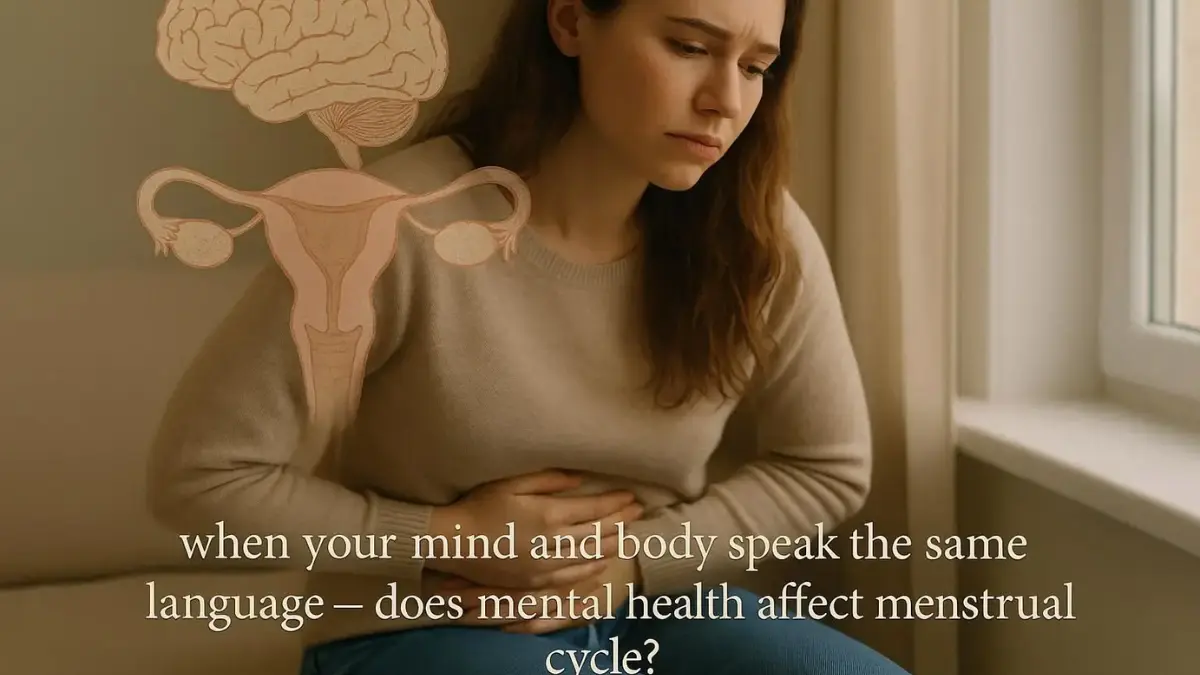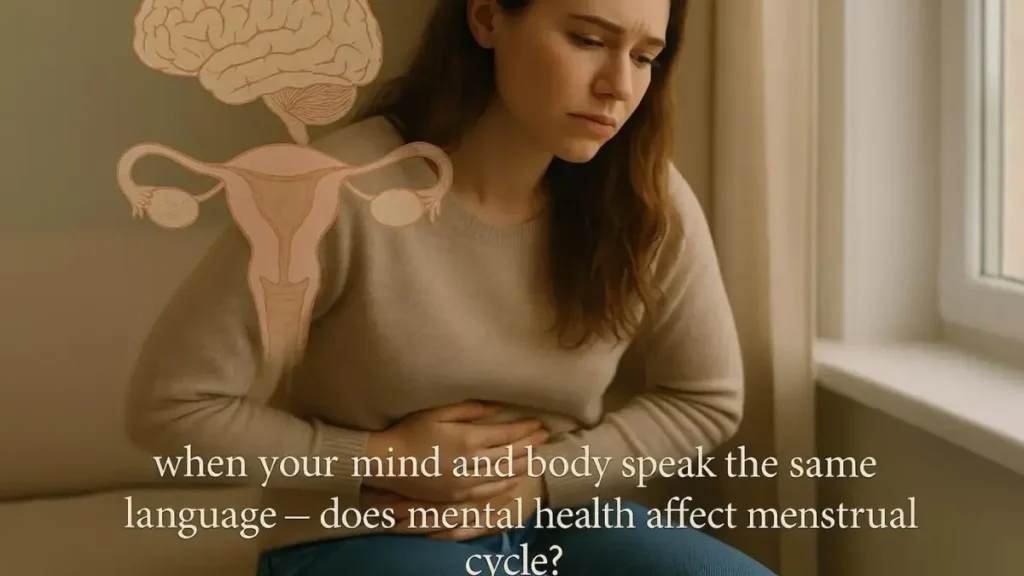Does mental health affect menstrual cycle? Ever noticed your period go off-track right when life feels like too much to handle? You’re not imagining it. Stress, anxiety, or emotional turmoil can silently disrupt your menstrual rhythm — sometimes delaying your period, sometimes making it heavier, and often making PMS feel like a war zone.
In today’s fast-paced world, where mental strain is practically normal, understanding the link between mental health and the menstrual cycle isn’t optional — it’s essential. Because yes, mental health can absolutely affect your menstrual cycle.
Let’s unpack the science, symptoms, and strategies behind this powerful mind-body connection — and learn how to take control again.
The Science Behind the Chaos — How Your Brain Controls Your Period
Your menstrual cycle isn’t run by your uterus alone — it’s orchestrated by your brain. The brain communicates with your reproductive system through a complex hormonal chain called the HPA axis (Hypothalamic–Pituitary–Adrenal) and HPG axis (Hypothalamic–Pituitary–Gonadal).
How It Works
- The hypothalamus in your brain sends signals to the pituitary gland, which then tells your ovaries when to release eggs and produce hormones.
- Hormones like estrogen and progesterone regulate your cycle’s timing, flow, and emotional balance.
When mental health takes a hit — say, from stress or trauma — the hypothalamus becomes confused. It may delay sending signals, reduce hormone release, or pause ovulation altogether. That’s when irregular periods, spotting, or even complete cycle pauses happen.
Stress Hormone Interference
Chronic stress floods your body with cortisol, the infamous stress hormone. Cortisol suppresses reproductive hormones to conserve energy for “survival mode.” Your body interprets high stress as a sign that it’s not a good time for pregnancy — so it shuts down reproductive functions temporarily.
Insight:
High cortisol disrupts communication between the brain and ovaries, proving that mental health directly affects the menstrual cycle.
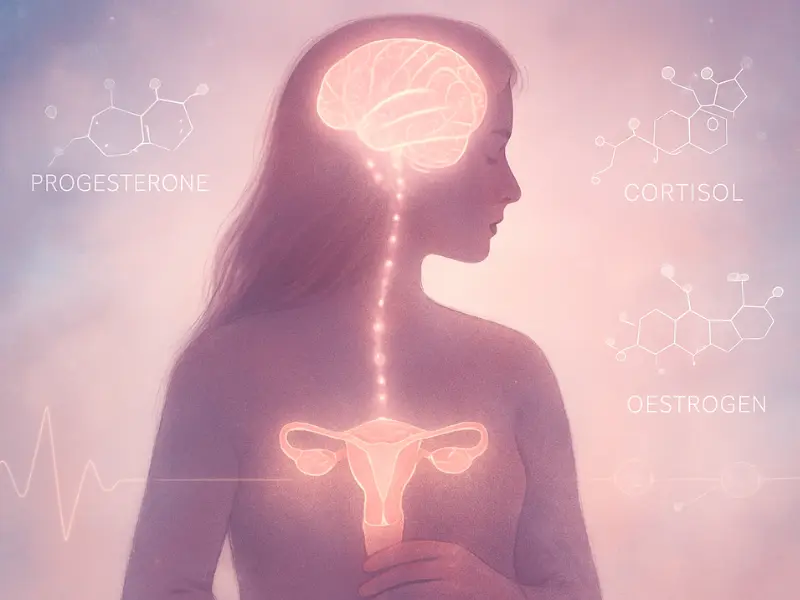
Does Mental Health Affect Menstrual Cycle Irregularities?
Stress doesn’t just cause you to miss your period. It changes how your entire cycle feels.
Emotional Stress = Hormonal Chaos
Women facing continuous emotional stress — due to work pressure, relationship issues, or trauma — often experience shortened or prolonged cycles, irregular bleeding, and intense cramps. Your emotional state directly shapes your hormonal environment.
Research from the Journal of Psychosomatic Obstetrics & Gynecology found that women under high stress were twice as likely to have irregular cycles compared to those under low stress. This strongly answers the question — does mental health affect menstrual cycle? Yes, significantly.
The Double Hit: Anxiety and PMS
Anxiety magnifies PMS symptoms. When your cortisol and adrenaline levels spike, you’re more likely to experience mood swings, bloating, and irritability. This happens because cortisol competes with progesterone, the hormone that usually calms and stabilizes mood before your period.
So yes — the question “does mental health affect menstrual cycle” has a powerful, research-backed answer: absolutely, and it can make every period feel unpredictable.
Important Note:
Emotional instability equals hormonal instability — the body and mind never work separately.
Also Read: Best Laptops for College Students in 2025 – Power, Style & Affordability You’ll Love
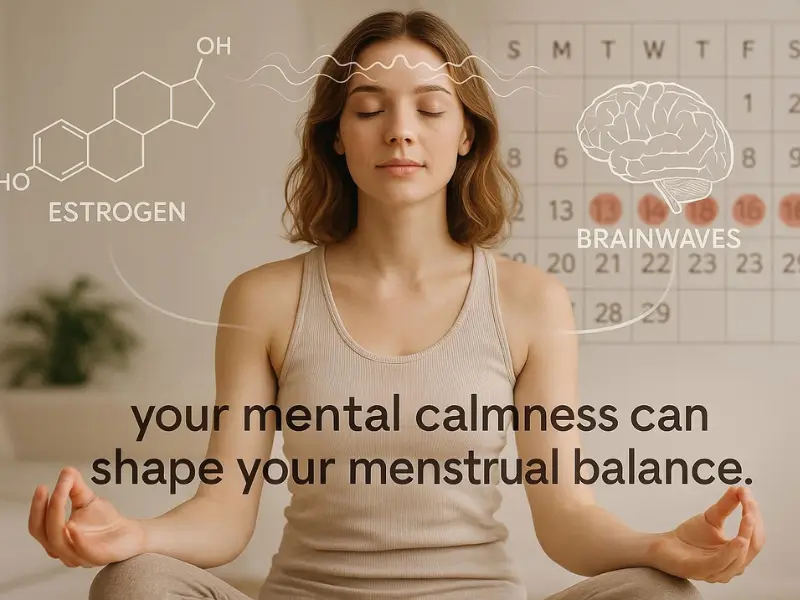
Depression, Anxiety, and the Silent Impact on Hormones
Let’s dig deeper into how specific mental health conditions affect your cycle. Understanding this helps prove further how does mental health affect menstrual cycle biologically.
Depression: The Hormone Blocker
Depression disrupts the HPA axis, leading to altered secretion of gonadotropin-releasing hormone (GnRH). This hormone tells your ovaries when to release eggs. Without proper GnRH function, your menstrual rhythm falters — leading to missed cycles, lighter bleeding, or irregular flow.
Some antidepressants, especially SSRIs, can also slightly modify estrogen metabolism — which can affect your period’s duration and intensity.
Anxiety: The Cortisol Storm
Chronic anxiety keeps your stress response activated 24/7, constantly releasing cortisol. Over time, this hormonal overload can lead to anovulatory cycles (when ovulation doesn’t occur) or menstrual suppression.
This is why women dealing with long-term anxiety often report late or unpredictable periods, sometimes followed by heavy bleeding once their body finally “resets.”
Takeaway:
Depression blunts hormonal signaling, while anxiety floods your system with cortisol — both clearly show does mental health affect menstrual cycle.

When Periods Affect Your Mind — The Reverse Relationship
It’s not a one-way street. Your mental health affects your cycle — but your cycle also affects your mental health. This emotional-hormonal feedback loop is one major reason why mental health affects menstrual cycle regularity and intensity.
Hormones and Mood Swings
Throughout your menstrual cycle, estrogen and progesterone rise and fall. These hormones directly influence serotonin, the brain chemical that stabilizes mood. When estrogen dips (especially before your period), serotonin drops too — triggering sadness, irritability, or anxiety.
This hormonal rollercoaster is the reason behind PMS and PMDD (Premenstrual Dysphoric Disorder) — where emotional symptoms become so severe they mimic depression or anxiety disorders.
The Emotional Toll
Women with existing mental health challenges may feel their symptoms intensify before menstruation. Brain fog, low energy, or irritability during the luteal phase aren’t “just moodiness” — they’re biological responses to hormonal shifts.
Insight:
Hormones affect your emotions, and your emotions affect hormones — proving how mental health and menstrual cycles are inseparable.

How to Regain Control — Balancing Mental and Menstrual Health
The good news? You can rebalance your mind-body connection through conscious lifestyle choices. These strategies help both mental well-being and menstrual regularity.
1. Prioritize Stress Relief
Daily stress management is non-negotiable. Try:
- Mindful meditation (10 minutes/day)
- Breathing exercises
- Yoga or stretching
- Digital detoxes
These help regulate cortisol levels and restore hormonal balance, improving how mental health affects menstrual cycle stability.
2. Eat for Hormonal Harmony
Fuel your body with nutrients that support both mental and reproductive health:
- Magnesium: Reduces cramps and anxiety (found in spinach, almonds).
- Vitamin B6: Balances mood and progesterone levels.
- Omega-3s: Help regulate serotonin and reduce inflammation.
- Iron: Prevents fatigue from heavy bleeding.
3. Sleep Is a Hormone Reset Button
Your body performs most of its hormonal regulation while you sleep. Aim for 7–8 hours of uninterrupted sleep. Poor sleep elevates cortisol and reduces estrogen stability.
4. Move Your Body
Regular, moderate exercise releases endorphins — natural stress relievers that counteract cortisol. Even 30 minutes of walking or cycling can improve hormonal rhythm.
5. Seek Professional Help
If stress, anxiety, or irregular periods persist, it’s time to consult a gynecologist or mental health professional. You might need a combined treatment plan — therapy for the mind and medication (if necessary) for hormonal correction.
Reminder:
You can’t fix hormonal chaos without fixing emotional chaos first. Taking care of mental health is key to stabilizing your menstrual cycle.

When Irregular Periods Prove How Mental Health Affects Menstrual Cycle
Sometimes, an off-track period isn’t “just stress.” It could be your body waving a red flag, showing that mental health affects menstrual cycle regulation far more deeply.
Red Flags to Watch
- Periods missing for 3 months or more
- Extremely heavy bleeding or painful cramps
- Sudden mood crashes before menstruation
- Chronic fatigue or low libido
These symptoms could indicate PCOS (Polycystic Ovary Syndrome), thyroid imbalance, or PMDD, all of which are worsened by poor mental health.
The Power of Early Intervention
Early diagnosis can prevent long-term hormonal imbalance. If your stress is constant, or your period has vanished without reason, don’t ignore it. Getting tested for hormone levels (estrogen, progesterone, cortisol) can reveal the underlying cause.
Takeaway:
Ignoring your mental health can turn temporary period problems into chronic hormonal disorders — another clear example that mental health affects menstrual cycle consistency.
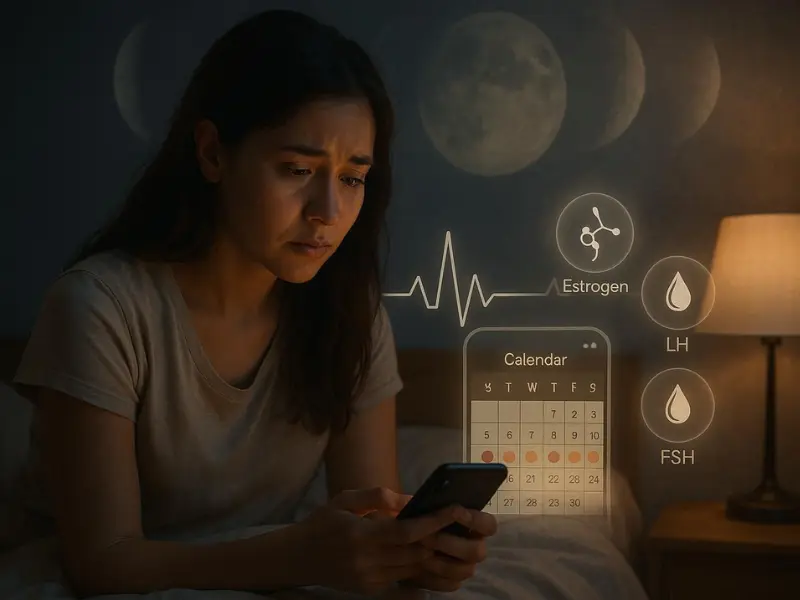
Quick Summary
- Mental health and menstrual health are tightly connected through hormonal communication.
- Chronic stress elevates cortisol, delaying or halting ovulation.
- Anxiety and depression change reproductive hormone function.
- Hormonal fluctuations influence emotional stability.
- Balanced lifestyle and therapy restore mind-body harmony.
Also Read: Top Countries with Digital Nomad Visas in 2025 for an Amazing Remote Lifestyle
FAQs
Does mental health affect menstrual cycle directly or indirectly?
Yes, mental health does affect the menstrual cycle both directly and indirectly. When you experience stress or anxiety, your body releases higher levels of cortisol — the stress hormone. This can interfere with estrogen and progesterone production, the hormones responsible for regulating your periods. As a result, your menstrual cycle may become irregular, lighter, heavier, or even skip a month entirely.
Can anxiety and depression change my menstrual cycle?
Absolutely. Chronic anxiety or depression can disrupt your body’s natural hormonal rhythm. These mental health conditions often lead to sleep problems, appetite changes, and stress hormone imbalances — all of which influence your menstrual cycle. Over time, you may notice longer cycles, painful cramps, or unpredictable bleeding patterns.
How does stress delay your period?
When you’re under constant stress, your brain’s hypothalamus (which controls hormones) slows down the signals to your ovaries. This delay in communication can postpone ovulation, which in turn delays your period. So yes, if you’re wondering, does mental health affect menstrual cycle timing? — it certainly can.
Can improving mental health fix irregular periods?
In many cases, yes. When you focus on improving your mental health — through therapy, meditation, balanced sleep, or reduced stress — your hormones begin to stabilize. This balance helps your menstrual cycle return to its natural rhythm. However, if your irregular periods continue for several months, it’s best to consult a gynecologist to rule out any underlying medical issues.
Can therapy or lifestyle changes restore a normal menstrual cycle?
Yes, therapy and lifestyle changes can make a big difference. Counseling or mindfulness therapy helps reduce chronic stress and anxiety, while exercise, proper sleep, and nutrition support hormone regulation. Together, they can help bring your cycle back to normal — proving once again that mental health does affect the menstrual cycle in powerful ways.






